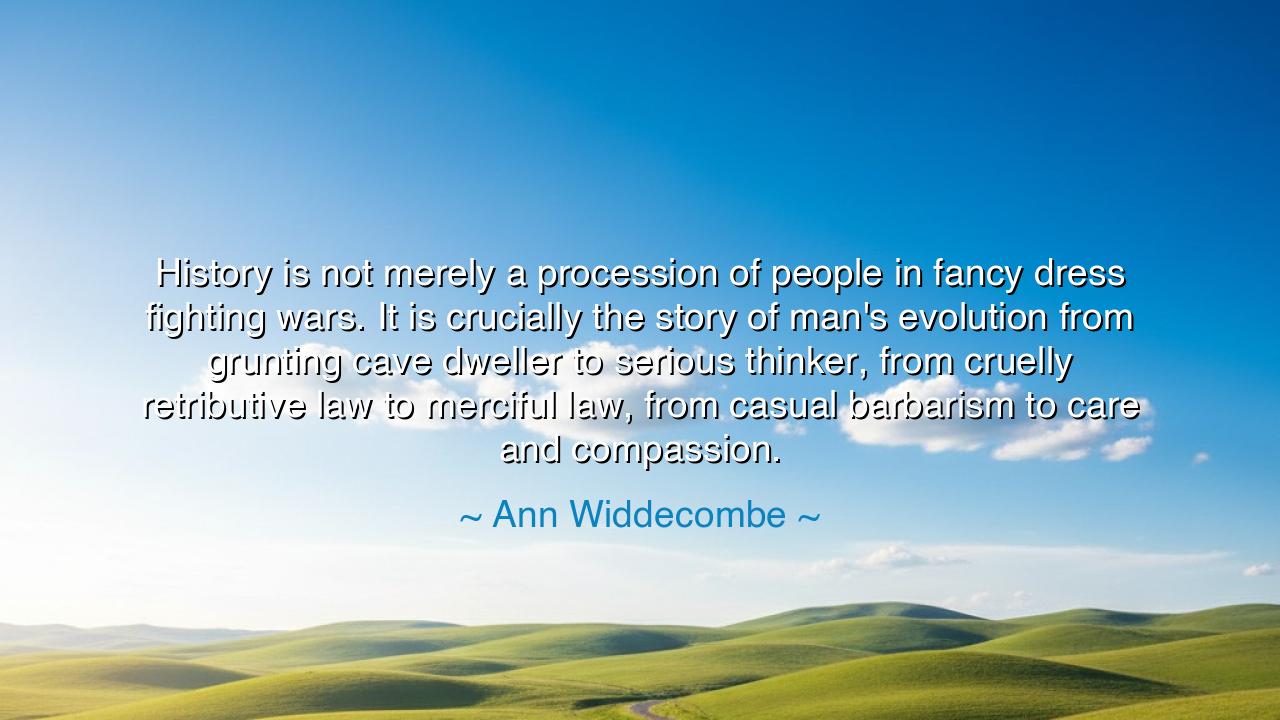
History is not merely a procession of people in fancy dress
History is not merely a procession of people in fancy dress fighting wars. It is crucially the story of man's evolution from grunting cave dweller to serious thinker, from cruelly retributive law to merciful law, from casual barbarism to care and compassion.






In the words of Ann Widdecombe, there resounds a reminder to all who would study the past with shallow eyes: “History is not merely a procession of people in fancy dress fighting wars. It is crucially the story of man’s evolution from grunting cave dweller to serious thinker, from cruelly retributive law to merciful law, from casual barbarism to care and compassion.” These words, though calm in tone, strike with the force of truth long neglected. For too often, men look upon history as spectacle — as a gallery of kings and battles, crowns and conquests — forgetting that beneath the armor and the banners lies something greater: the journey of the human spirit, rising slowly, painfully, toward enlightenment.
The origin of this insight springs from Widdecombe’s own reflections as a student of history, politics, and human conduct. In her time as a public servant and commentator, she came to see how easily people mistake the outer trappings of civilization for civilization itself. The past, to many, is pageantry — the glitter of courts, the smoke of battlefields, the rise and fall of empires. Yet, she reminds us that these are but the surface ripples of a deeper river — the flow of humanity’s moral and intellectual growth. History, in her view, is not the story of power, but of progress — not the march of armies, but the awakening of conscience.
When she speaks of the evolution from grunting cave dweller to serious thinker, she evokes the long arc of mankind’s ascent from instinct to reason. In that image, one sees the firelight flickering upon the walls of the first caves, where humans painted their fears and dreams upon stone — the earliest record of thought. From those crude beginnings rose philosophers, poets, and scientists — from Socrates, who questioned the nature of justice, to Newton, who glimpsed the laws that bind the stars. Each mind that dared to ask why carried humanity a little further from darkness into light. Widdecombe reminds us that the true history of man is not written in blood or gold, but in ideas — in the slow, relentless pursuit of understanding.
Yet her words reach deeper still, for she speaks also of the transformation of law — from the cruelly retributive to the merciful. In the earliest ages, justice was vengeance: an eye for an eye, a life for a life. The tribes of man, still close to their primal nature, knew only the language of punishment. But as reason grew, compassion took root. The law evolved from retribution to rehabilitation, from the hand that strikes to the hand that heals. Consider Hammurabi, whose code carved justice into stone — harsh, yet a step beyond chaos. Centuries later came Cicero, who spoke of law as reason itself. Later still, in the teachings of Christ and the writings of enlightened thinkers, justice began to wear the face of mercy. Thus, through pain and reflection, humanity learned that strength lies not in domination, but in understanding.
Widdecombe’s final contrast — from casual barbarism to care and compassion — is the culmination of this journey. The barbarism she names is not gone from the world; it slumbers still in the hearts of men. Yet her faith in the progress of the human spirit stands firm: that we have moved, however imperfectly, from cruelty toward empathy. Look to Florence Nightingale, tending the wounded amidst the horror of war, or to William Wilberforce, who fought to end the slave trade — their deeds are the milestones of moral evolution. These are not warriors in the traditional sense, but they fought the greater battle: the war against indifference. Through them, humanity learned that compassion is not weakness, but the highest form of strength.
There is in Widdecombe’s quote an exhortation to see history not as distant, but as living — a mirror of our own moral choices. For the story of mankind’s evolution is not finished; we are still writing it. The same forces that shaped the past — ignorance, greed, cruelty, but also courage, curiosity, and love — remain within us. Every act of mercy, every question asked, every injustice challenged continues the work of centuries. The lesson is clear: we are not merely descendants of history; we are its authors. Each generation must decide whether to advance the human story toward light or let it fall again into shadow.
Therefore, my listener, take this wisdom to heart: when you study history, look not only at the crowns and the wars, but at the hearts that beat beneath them. Seek the quiet revolutions — the moments when thought triumphed over instinct, when mercy conquered wrath. Remember that your own life, too, is part of this vast chronicle. Every choice you make — to forgive, to learn, to care — continues the long evolution that began in the cave and leads toward the stars.
For as Ann Widdecombe teaches, history is not the story of power, but the story of progress — not the record of what mankind has conquered, but of what it has become. And so, let us honor our ancestors not by repeating their battles, but by perfecting their hopes. Let us write the next chapter not in blood, but in compassion, not in conquest, but in wisdom. For the true history of humanity — the one worth remembering — is the history of our ascent from darkness toward light.






AAdministratorAdministrator
Welcome, honored guests. Please leave a comment, we will respond soon